
Chapter 26
Saving, Investment, and the Financial System
TRUE/FALSE
1. The financial system coordinates investment and saving, which are important determinants of long-run real
GDP.
ANS: T DIF: 1 REF: 26-1
NAT: Analytic LOC: The Study of economics, and definitions of economics
TOP: Investment | Saving MSC: Definitional
2. When economists refer to investment, they mean the purchasing of stocks and bonds and other types of saving.
ANS: F DIF: 1 REF: 26-1
NAT: Analytic LOC: The Study of economics, and definitions of economics
TOP: Investment | Saving MSC: Definitional
3. Banks and mutual funds are examples of financial markets.
ANS: F DIF: 1 REF: 26-1
NAT: Analytic LOC: The Study of economics, and definitions of economics
TOP: Financial intermediaries | Financial markets MSC: Definitional
4. When a firm wants to borrow directly from the public to finance the purchase of new equipment, it does so by
selling shares of stock.
ANS: F DIF: 1 REF: 26-1
NAT: Analytic LOC: The Study of economics, and definitions of economics
TOP: Bonds | Stock MSC: Definitional
5. Most entrepreneurs finance their purchases of real capital using their past saving.
ANS: F DIF: 1 REF: 26-1
NAT: Analytic LOC: The Study of economics, and definitions of economics
TOP: Investment MSC: Definitional
6. Other things the same, the higher the rate of saving and investment in a country, the higher will be the
standard of living.
ANS: T DIF: 1 REF: 26-1
NAT: Analytic LOC: The Study of economics, and definitions of economics
TOP: Saving | Investment MSC: Interpretive
7. Lenders sell bonds and borrowers buy them.
ANS: F DIF: 1 REF: 26-1
NAT: Analytic LOC: The Study of economics, and definitions of economics
TOP: Bonds MSC: Definitional
8. When a firm wants to borrow directly from the public to finance the purchase of new equipment, it does so by
selling bonds.
ANS: T DIF: 1 REF: 26-1
NAT: Analytic LOC: The Study of economics, and definitions of economics
TOP: Bonds | Stock MSC: Definitional
9. Other things the same, corporate bonds generally feature higher interest rates than U.S. government bonds.
ANS: T DIF: 1 REF: 26-1
NAT: Analytic LOC: The Study of economics, and definitions of economics
TOP: Bonds MSC: Definitional
206

207 Chapter 26/Saving, Investment, and the Financial System
10. The sale of either stocks or bonds to raise money is known as equity finance.
ANS: F DIF: 1 REF: 26-1
NAT: Analytic LOC: The Study of economics, and definitions of economics
TOP: Bonds | Stock MSC: Definitional
11. When a corporation experiences financial problems, bondholders are paid before stockholders.
ANS: T DIF: 1 REF: 26-1
NAT: Analytic LOC: The Study of economics, and definitions of economics
TOP: Bonds | Stock MSC: Definitional
12. Corporations receive no proceeds from the resale of their stock.
ANS: T DIF: 1 REF: 26-1
NAT: Analytic LOC: The Study of economics, and definitions of economics
TOP: Stock MSC: Definitional
13. Generally, if people begin to expect a company to have higher future profits, the price of the company’s stock
will begin to decrease.
ANS: F DIF: 2 REF: 26-1
NAT: Analytic LOC: The Study of economics, and definitions of economics
TOP: Stock MSC: Interpretive
14. If a share of stock in Skylight Chili sells for $75, the retained earnings per share are $5, and the divided per
share is $2, then the price-earnings ratio is 15.
ANS: F DIF: 2 REF: 26-1
NAT: Analytic LOC: The Study of economics, and definitions of economics
TOP: Stock MSC: Applicative
15. If people become less optimistic about the future earnings of Hyde Park Jazz Studio, then the price of the
company’s stock will fall.
ANS: T DIF: 1 REF: 26-1
NAT: Analytic LOC: The Study of economics, and definitions of economics
TOP: Stock. MSC: Interpretive
16. Mutual funds are a type of financial intermediary.
ANS: T DIF: 1 REF: 26-1
NAT: Analytic LOC: The Study of economics, and definitions of economics
TOP: Mutual funds | Financial intermediaries MSC: Definitional
17. Index funds are usually outperformed by mutual funds that are actively managed by professional money
managers.
ANS: F DIF: 1 REF: 26-1
NAT: Analytic LOC: The Study of economics, and definitions of economics
TOP: Mutual funds MSC: Definitional
18. To state that national saving is equal to investment, for a closed economy, is to state an accounting identity.
ANS: T DIF: 1 REF: 26-2
NAT: Analytic LOC: The Study of economics, and definitions of economics
TOP: Identities MSC: Interpretive
19. National saving is equal to Y - T - C.
ANS: F DIF: 2 REF: 26-2
NAT: Analytic LOC: The Study of economics, and definitions of economics
TOP: National saving MSC: Interpretive
20. Public saving is T - G, while private saving is Y - T - C.
ANS: T DIF: 1 REF: 26-2
NAT: Analytic LOC: The Study of economics, and definitions of economics
TOP: Private saving | Public saving MSC: Interpretive

Chapter 26/Saving, Investment, and the Financial System 208
21. Public saving is equal to national saving minus private saving.
ANS: T DIF: 2 REF: 26-2
NAT: Analytic LOC: The Study of economics, and definitions of economics
TOP: National saving MSC: Definitional
22. To state that public saving is equal to investment, for a closed economy, is to state an accounting identity.
ANS: F DIF: 1 REF: 26-2
NAT: Analytic LOC: The Study of economics, and definitions of economics
TOP: Identities MSC: Interpretive
23. In a closed economy, investment must be equal to private saving.
ANS: F DIF: 2 REF: 26-2
NAT: Analytic LOC: The Study of economics, and definitions of economics
TOP: Private saving | Investment MSC: Definitional
24. If, for an imaginary closed economy, investment amounts to $10,000 and the government is running a $2,500
deficit, then private saving must amount to $12,500.
ANS: T DIF: 2 REF: 26-2
NAT: Analytic LOC: The Study of economics, and definitions of economics
TOP: Identities | Private saving | Investment MSC: Applicative
25. If, for an imaginary closed economy, investment amounts to $12,000 and the government is running a $2,000
deficit, then private saving must amount to $10,000.
ANS: F DIF: 2 REF: 26-2
NAT: Analytic LOC: The Study of economics, and definitions of economics
TOP: Identities | Private saving | Investment MSC: Applicative
26. Suppose a small closed economy has GDP of $5 billion, consumption of $3 billion, and government
expenditures of $1 billion. Then investment and national saving are both $1 billion.
ANS: T DIF: 2 REF: 26-2
NAT: Analytic LOC: The Study of economics, and definitions of economics
TOP: National saving | Investment MSC: Applicative
27. Joan uses some of her income to buy mutual fund shares. A macroeconomist refers to Joan's purchase as
investment.
ANS: F DIF: 1 REF: 26-2
NAT: Analytic LOC: The Study of economics, and definitions of economics
TOP: Saving | Investment MSC: Interpretive
28. Alberta buys a paint sprayer and a lift for her car customizing shop. A macroeconomist would refer to these
purchases as investment.
ANS: T DIF: 1 REF: 26-2
NAT: Analytic LOC: The Study of economics, and definitions of economics
TOP: Investment MSC: Interpretive
29. The demand for loanable funds comes from saving and the supply of loanable funds comes from investment.
ANS: F DIF: 1 REF: 26-3
NAT: Analytic LOC: The Study of economics, and definitions of economics
TOP: Market for loanable funds MSC: Definitional
30. A decrease in taxes on interest income would increase the interest rate.
ANS: F DIF: 2 REF: 26-3
NAT: Analytic LOC: The Study of economics, and definitions of economics
TOP: Saving | Market for loanable funds MSC: Applicative
31. If Congress instituted an investment tax credit, the demand for loanable funds would shift rightward.
ANS: T DIF: 2 REF: 26-3
NAT: Analytic LOC: The Study of economics, and definitions of economics
TOP: Investment MSC: Applicative

209 Chapter 26/Saving, Investment, and the Financial System
32. When the government budget deficit rises, national saving is reduced, interest rates rise, and investment falls.
ANS: T DIF: 2 REF: 26-3
NAT: Analytic LOC: The Study of economics, and definitions of economics
TOP: Budget deficits MSC: Applicative
33. The term crowding out refers to decreases in the interest rate caused by government budget surpluses.
ANS: F DIF: 2 REF: 26-3
NAT: Analytic LOC: The Study of economics, and definitions of economics
TOP: Crowding out MSC: Definitional
34. When the U.S. government is in debt during a given year, it follows that its budget is in deficit for that year.
ANS: F DIF: 1 REF: 26-3
NAT: Analytic LOC: The Study of economics, and definitions of economics
TOP: Government debt | Budget deficits MSC: Interpretive
35. The ratio of government debt to GDP was higher during the Reagan presidency than at any previous time in
U.S. history.
ANS: F DIF: 1 REF: 26-3
NAT: Analytic LOC: The Study of economics, and definitions of economics
TOP: Government debt MSC: Definitional
36. An increase in the demand for loanable funds increases the equilibrium interest rate and increases the
equilibrium level of saving.
ANS: T DIF: 2 REF: 26-3
NAT: Analytic LOC: Understanding and applying economic models
TOP: Market for loanable funds MSC: Applicative
37. An increase in the demand for loanable funds increases the equilibrium interest rate and decreases the
equilibrium level of saving.
ANS: F DIF: 2 REF: 26-3
NAT: Analytic LOC: Understanding and applying economic models
TOP: Market for loanable funds MSC: Applicative
38. The term loanable funds refers to all income that is not used for consumption.
ANS: F DIF: 2 REF: 26-3
NAT: Analytic LOC: The Study of economics, and definitions of economics
TOP: Market for loanable funds MSC: Definitional
39. The term loanable funds refers to all income that is not used for consumption or government expenditures.
ANS: T DIF: 2 REF: 26-3
NAT: Analytic LOC: The Study of economics, and definitions of economics
TOP: Market for loanable funds MSC: Definitional
40. We interpret the term loanable funds to mean the flow of resources available to fund private investment.
ANS: T DIF: 2 REF: 26-3
NAT: Analytic LOC: The Study of economics, and definitions of economics
TOP: Market for loanable funds MSC: Interpretive
41. An increase in the budget deficit shifts the demand for loanable funds to the right.
ANS: F DIF: 2 REF: 26-3
NAT: Analytic LOC: The Study of economics, and definitions of economics
TOP: Budget deficits MSC: Applicative
42. A government may use deficit financing to smooth tax rates over time.
ANS: T DIF: 2 REF: 26-3
NAT: Analytic LOC: The Study of economics, and definitions of economics
TOP: Budget deficits MSC: Analytic

Chapter 26/Saving, Investment, and the Financial System 210
SHORT ANSWER
1. What are the basic differences between bonds and stocks?
ANS:
A bond is a certificate of indebtedness that specifies the obligations of the borrower to the holder of the bond, while
stock represents a share of ownership in a firm and is, therefore, a claim on the profits that the firm makes. The sale
of bonds to raise money is called debt finance, while the sale of stock is called equity finance. Whereas the owner of
shares of stock in a company share in the profits of a company, the owner of bonds receives a fixed interest rate.
Compared to bonds, stocks offer the holder both higher risk and a potentially higher return.
DIF: 2 REF: 26-1 NAT: Analytic
LOC: The Study of economics, and definitions of economics TOP: Stock | Bonds
MSC: Interpretive
2. Which of the two bonds in each example would you expect to generally pay the higher interest rate? Explain
why.
a. a U.S. government bond or a Brazilian government bond
b. a U.S. government bond or a municipal bond with the same term and issued by a creditworthy
municipality.
c. a 6-month Treasury bill or a 20-year Treasury bond
d. a Microsoft bond or a bond issued by a new recording company
ANS:
a. The Brazilian government bond would likely pay a higher interest rate because the market perceives a
higher level of risk for the Brazilian bond relative to the U.S. bond.
b. Because of the tax advantages of municipal bonds, the U.S. government bond would likely pay the
higher interest rate.
c. The 20-year bond would likely pay a higher interest rate than would the 6-month bill. The future is
uncertain and therefore more risky for a 20-year bond than for a 6-month bill.
d. Since Microsoft is less likely to default than a new and unknown company, the interest on the bond of
the new company is likely to be higher.
DIF: 2 REF: 26-1 NAT: Analytic
LOC: The Study of economics, and definitions of economics TOP: Bonds
MSC: Applicative
3. Suppose that you are a broker and people tell you the following about themselves. What sort of bond would
you recommend to each? Defend your choices.
a. "I am in a high federal income tax bracket and I don't want to take very much risk."
b. "I want a high return and I am willing to take a lot of risk to get it."
c. "I want a decent return and I have enough deductions that I don't value tax breaks highly."
ANS:
a. A municipal bond. Municipal bonds generally have low credit risk and are not subject to federal income
tax.
b. A junk bond. Junks bonds have a high return because they have high risk.
c. A corporate bond that isn't a junk bond. Corporate bonds have more risk than government bonds but
have no special tax treatment, so they pay moderate rates of return.
DIF: 2 REF: 26-1 NAT: Analytic
LOC: The Study of economics, and definitions of economics TOP: Bonds
MSC: Analytical



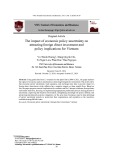
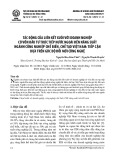
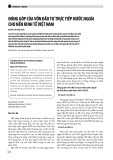

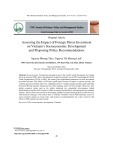
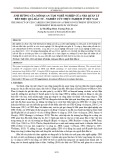


![Câu hỏi ôn tập Kinh tế môi trường: Tổng hợp [mới nhất/chuẩn nhất]](https://cdn.tailieu.vn/images/document/thumbnail/2025/20251223/hoaphuong0906/135x160/56451769158974.jpg)




![Giáo trình Kinh tế quản lý [Chuẩn Nhất/Tốt Nhất/Chi Tiết]](https://cdn.tailieu.vn/images/document/thumbnail/2026/20260122/lionelmessi01/135x160/91721769078167.jpg)









